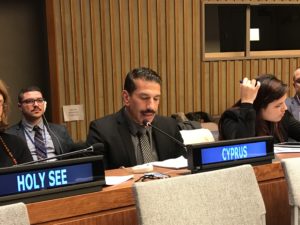Item 55 – Comprehensive Review of the whole question of peacekeeping operations in all their aspects 
United Nations, 26 October 2016
Thank you Mr. Chair,
Cyprus aligns itself with the statement of the European Union and would like to add the following in its national capacity.
The 2015 reviews focused on UN peace operations, peacebuilding architecture, and women, peace and security were all inspired by the urgent need to strengthen the coherence of the UN system as part of renewed efforts to address root causes of fragility, conflict and violence and effectively deal with new threats and challenges to international peace and security, which ultimately aim at sustaining peace. Cyprus concurs to the common patterns that emerged from the different reviews and supports the call of the SG for a “comprehensive, modern and effective operational peace architecture, encompassing prevention, conflict resolution, peacekeeping, peacebuilding and long-term development – the peace ‘continuum’’.
At a time of increasing challenges around the globe, both in number and in scope, it is more important than ever to ensure that peacekeeping missions, which constitute the cornerstone of the ‘peace and security’ pillar of the UN, are well-placed to implement their mandates effectively and efficiently. We fully understand that current circumstances necessitate the reform of peacekeeping operations to a certain extent.
Cyprus strongly believes in the vital role of UN peacekeeping missions around the world. They save lives, prevent mass atrocities and conflict, and they set the stage for stability and sustainable peace. These are just some of the reasons why the presence of 15 UN peacekeeping missions around the globe should not fall hostage to motives of expediency or money-saving; after all, today’s peacekeeping budget is less than 0.5% of global military spending. On the contrary, each peacekeeping operation should be evaluated in its own merit, based on actual needs and threats on the ground, the political context of its presence, the ramifications of its reform and the views of the host government.
As a host country of a peacekeeping operation since 1964, Cyprus is particularly grateful to the UN and to all of UNFICYP’s personnel-contributing countries for their decades-long involvement on the island. At the same time, we feel that we have acquired valuable experience from the long-standing hosting of a UN peacekeeping operation and, as such, we welcome the opportunity to share some remarks:
1) UNFICYP is currently undergoing a review, mandated by the Security Council in July and expected to be completed in November. During this review, it should be borne in mind that the situation on the ground has, unfortunately, not changed since 1974. As long as foreign occupation of almost 37% of the island’s territory persists, the host government deems the continued presence of UNFICYP (and particularly its military component), in its current mandate and configuration, as indispensable. Furthermore, UNFICYP is the least costly UN peacekeeping operation, constituting only 0.5% of the total peacekeeping budget, given that Cyprus and Greece voluntarily cover almost 50% of the Force’s resources. Finally, we expect that, during this process, the Secretariat will fully abide by the Security Council directive that the review must be ‘focused on findings and recommendations for how UNFICYP should be optimally configured to implement its existing mandate, based exclusively on rigorous evidence-based assessment of the impact of UNFICYP activities’.
In a time of global financial strain, Cyprus fully understands the need for better use of resources. However, we maintain the view that reducing the cost of peacekeeping should not constitute an end in itself; rather, looking into the possibility of savings should be just one of the parameters under examination in the process of peacekeeping reform. In this context, we should always keep in mind that the United Nations was created to ensure the safeguarding of international peace and security.
2) The single most important objective and priority of any tool at the disposal of the UN is to halt the use of force and to ensure it does not erupt again. But the lack of armed hostilities does not amount to there being peace. Bringing about sustainable peace and preventing conflict are equally important.
3) The substance of the parameters of a conflict and its root causes should be the key pillars of the UN’s involvement. The UN must not be distracted by exogenous factors that might attempt to influence its work. The powerful party in a conflict should not be allowed to impose its position at the expense of the weaker party.
4) Any review of peacekeeping operations should be guided by the situation on the ground. The objective and mandate should always correspond to the situation on the ground, and, in turn, the means available to an operation must correspond to its objective and mandate. A peacekeeping operation should have adequate resources to be able to fulfil the mandated task.
5) Objectivity and impartiality are key principles ensuring the United Nations’ credibility and ability to help a country address effectively the situation on the ground. The UN decisions and actions should be in line with the Charter, the UN resolutions, the case law of the International Court of Justice, and international law.
Mr. Chair
Despite the fact that the Cyprus problem persists, we are certain that the situation on the ground and the prospects for peace would now be much worse had it not been for the UN´s involvement all these years. The UN remains the forum through which a settlement can be achieved and should be at the forefront of efforts to reunite Cyprus.
I would finally like to reaffirm Cyprus’ commitment to work with all member states for an enhanced peace architecture that will ensure increased effectiveness with optimal use of the organization’s resources, while taking into account the particularities of each conflict or country.
Thank you Mr. Chair.